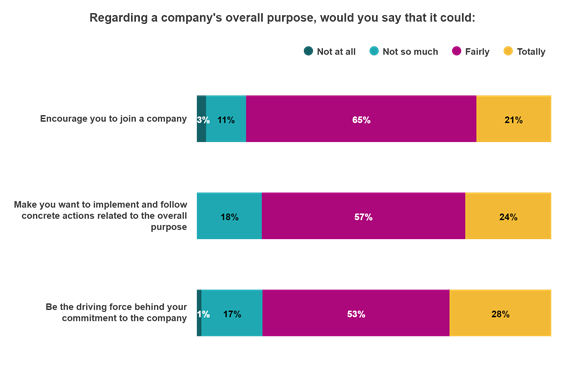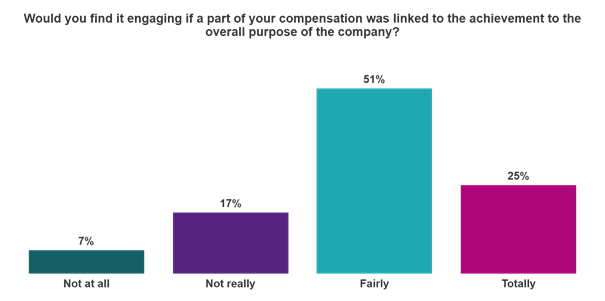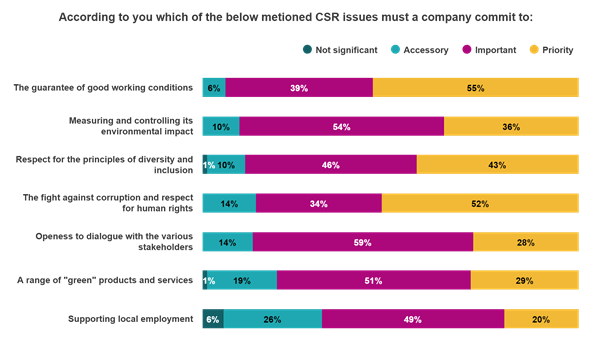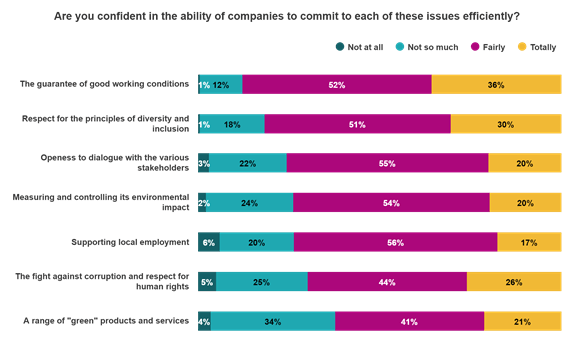There are many different aspects of an employer that attract - or put off - potential recruits, and the company’s societal and environmental mission is an increasingly important factor
Most employers treat the concept of Corporate Social Responsibility (CSR) and sustainability as a compliance and not a necessity. However, if not accompanied by accountable actions, their efforts for being more responsible may now be seen as an attempt to green wash and this could lead to a negative impact on their employer brand.
The UN's Sustainability Development Goals (SDGs) and Conferences of the Parties (COPs) are raising the next generation's awareness of the environmental and social challenges facing the planet. Their shift in priority foreshadows the type of corporate they would prefer and the employers that they would like to join.
The societal or environmental mission of a company is becoming an element of attraction for young talent as important as compensation.
To better understand this evolution, we surveyed 275 young international graduates, just starting their working lives, on their knowledge of CSR, engagement, and motivational drivers. When asked about their preferred employment situation, two thirds wanted to be salaried employees, 72% wanted to work in the private sector and 42% in an innovative company. They are aware of CSR concepts, with two thirds knowing well what a company's societal or environmental mission is and 53% what the UN's SDGs are, while a quarter have heard about the UN's SDGs.
Young graduates put great weight on the overall purpose of a company. More than eight out of ten respondents told us that being in phase with a company’s overall purpose would encourage them to join it and two out of ten would even make it a prerequisite.

This is further substantiated by their response to the question of whether they would find it engaging if their compensation was directly linked to the achievement of the company's overall purpose: 25% of respondents replied 'totally' and 51% replied 'fairly'.

These results highlight a new reality: the societal or environmental mission of a company is becoming an element of attraction for young talent as important as compensation.
As part of this study, we also interviewed human resources people from two Indian multinationals who are actively seeking young talent and their opinion differs from the youth's perspective. Both the companies have extensive CSR activities and goals. They are mission oriented and have tangible goals set with timelines regarding their sustainability activities.
But they don't utilise these activities or promote them as part of their recruitment process. They usually use benefits and compensation as a leverage for recruitment. Although they consider that candidates are attracted by sustainability and CSR, they believe these are not enough to convert them from aspirant to employee.
From the survey, we identified that young talent, after having their basic needs in the workplace met (work environment, remuneration, personal development etc.), focus heavily on the environmental and societal impact they could have through their company. 91% of respondents say that they would be motivated by objectives related to the overall purpose of the company (societal or environmental), right from the job description stage. Sustainability can be leveraged not just as a marketing tool for statutory and competitive benefits, but also as an effective commitment tool.
Young talent put a lot of hope in the ability of companies to tackle social and environmental issues, even if they still have some doubts about whether companies will engage that way. To secure the commitment of next generation employees, this belief must be built and reinforced by improving the awareness of CSR and sustainability activities along with gaining trust on basic aspects like working conditions and human rights.


The day is not far off when CSR and sustainability become a norm for companies and the top priority for candidates shortlisting an ideal company to work for. We recommend that companies set sustainability goals for the future and promote them during their recruitment process to attract the best talent and develop a culture from the beginning.
The traditional attributes being used by companies for attracting, engaging, and retaining their talents will soon become obsolete. The best way to differentiate themselves from competitors is through transparency of CSR and sustainability strategies that will create a virtuous dynamic towards a common purpose for the company and harmony among its employees.
The authors are under the supervision of the Geneviève Houriet Segard, EDHEC NewGen Talent Centre.
The views expressed in this article are those of the author(s) and do not necessarily reflect the position of HECSU/Prospects
Was this page useful?
Thank you for your feedback
